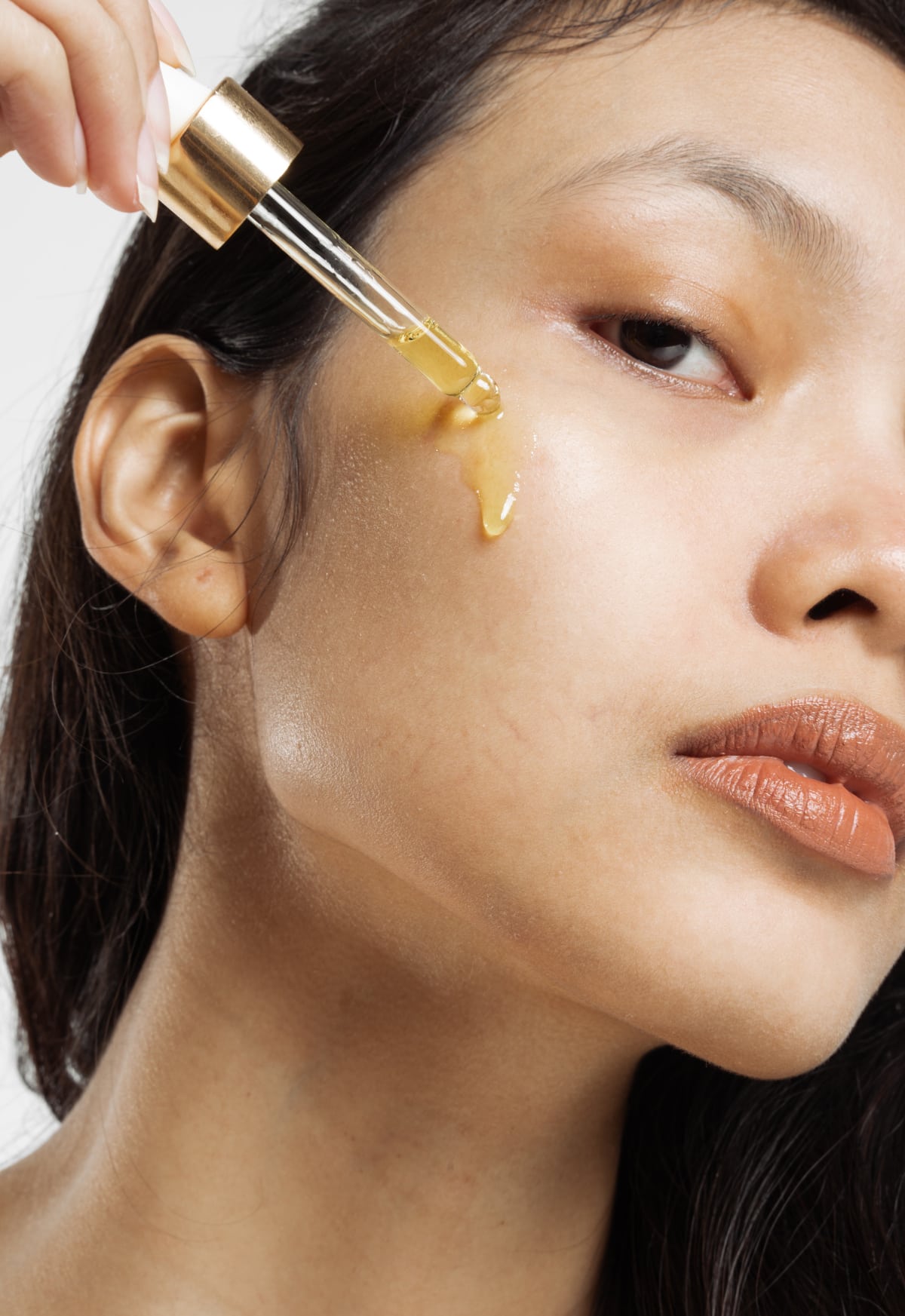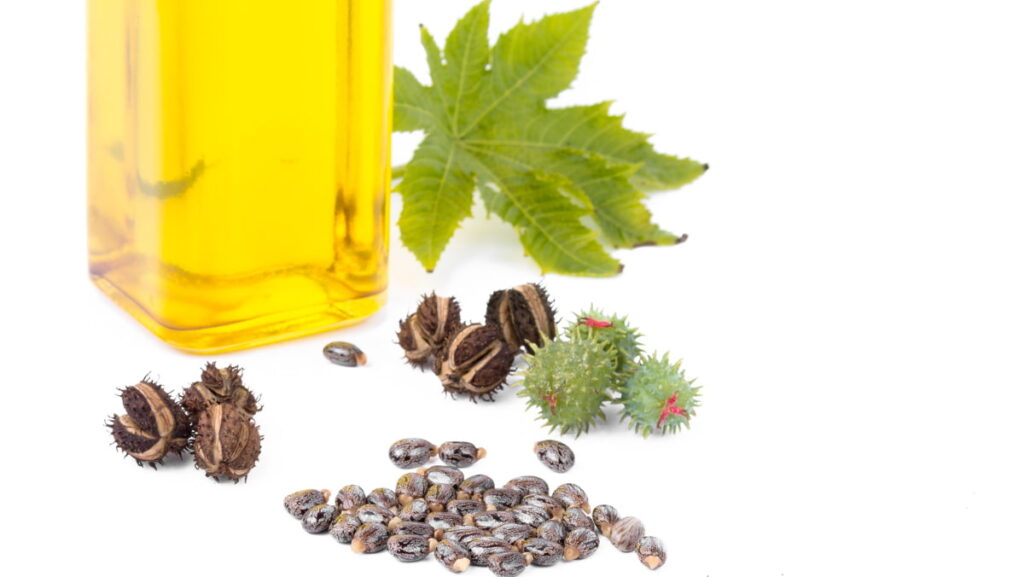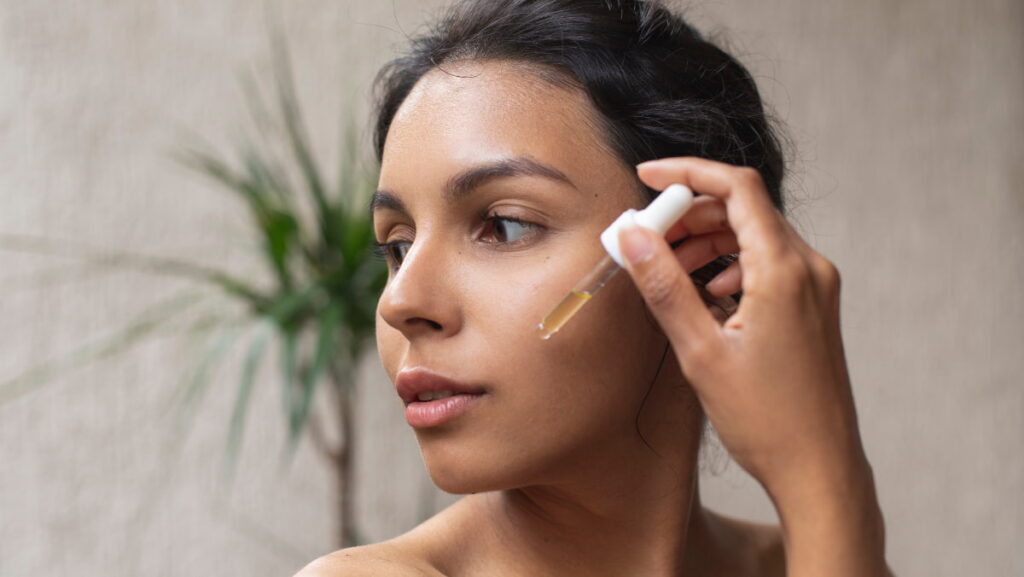
We often search for natural alternatives to skincare products, and castor oil stands out as a versatile, nourishing option.
Derived from the seeds of the Ricinus communis plant, this thick, nutrient-rich oil has been used for centuries to promote overall skin health.
The skincare industry is slowly picking up on this natural remedy and includes it in various products.
I’m excited to share the remarkable benefits of castor oil for the skin and why you should consider adding it to your skincare routine.
What Is Castor Oil
Castor oil is a vegetable oil derived from the seeds of the castor oil plant, scientifically known as Ricinus communis. It’s a thick, pale yellow to colorless oil that has been used for various purposes for centuries.
Castor oil is composed mainly of ricinoleic acid, a unique fatty acid that mainly contributes to its distinctive properties and potential benefits. It is also rich in tocopherols and phytochemicals that complete the picture of precious oil.
Castor oil is famously known as a natural laxative and as a medicine that induces labor. However, castor oil has been used for centuries for its dermatological uses, as well. Here are the healing properties of castor oil for the skin:
Castor oil is known for its potent hydrating properties, holding in moisture to keep your skin feeling supple and refreshed. It’s also rich in fatty acids, acting as an emollient, nourishing and supporting the skin’s natural barrier.
Incorporating castor oil into your skincare regime doesn’t end with hydration. It also has anti-inflammatory and antimicrobial properties, making it an excellent ally in the fight against inflammatory skin conditions like eczema and acne.
Castor oil is also a potent antioxidant, resisting oxidative damage caused by environmental stressors like UV radiation.
With all these exceptional properties, it’s clear that the benefits of castor oil for the skin will be no less impressive. Castor oil is more than just an old-fashioned remedy; its potential for better skin health is awe-inspiring.

7 Impressive Benefits Of Castor Oil For The Skin
Castor oil has been traditionally used as a valuable skin and scalp remedy. It is used to battle skin conditions, treat wounds, correct uneven skin tone and texture, and even boost hair growth and scalp health.
However, scientific research on the benefits of castor oil for the skin is limited. Most of its claimed uses are anecdotal and passed on from generation to generation.
Let’s uncover the secrets behind the benefits of castor oil for the skin together:
1. Castor Oil Gives Your Skin A Hydration Boost
Castor oil is a well-known natural remedy for dry and dehydrated skin. Castor oil acts as an occlusive, preventing water loss and locking moisture into your skin.
When I apply castor oil to my skin, I’ve noticed it keeps my skin feeling supple and well-hydrated throughout the day.
Because of its thick consistency, it may feel greasy and uncomfortable. The secret is to blend it with another oil or use it sparingly.
Allow castor oil’s occlusive properties to work wonders in maintaining your skin’s moisture balance.
2. Castor Oil Protects Your Lipid Barrier
Castor oil is rich in fatty acids, like linoleic, which work as excellent emollients. These emollients are essential for maintaining your skin’s natural barrier function by improving skin repair and permeability.
This barrier keeps harmful substances out and helps lock in moisture. By reinforcing your skin’s natural barrier, castor oil prevents water loss and bacteria from invading, keeping your skin healthy.
3. Castor Oil Soothes Inflamed Skin
One of the critical components of castor oil is ricinoleic acid, known for its remarkable ability to reduce inflammation. This, combined with its antimicrobial property, makes it a great candidate for battling inflammatory skin conditions.
A gentle massage with castor oil can help alleviate redness, itching, and swelling associated with skin conditions like eczema and psoriasis.
4. Castor Oil May Help Treat Skin Infections
Castor oil holds the potential for addressing skin infections, though its effectiveness hinges on the infection type and individual factors.
Ricinoleic acid, a component of castor oil, has displayed antimicrobial properties, suggesting it could hinder the growth of bacteria, fungi, and other microorganisms responsible for infections.
The oil’s anti-inflammatory attributes further assist by diminishing associated skin inflammation and relieving discomfort, redness, and swelling.
However, it’s important to note that while castor oil offers these benefits, its efficacy varies. Consulting a healthcare professional for severe infections remains essential for accurate diagnosis and appropriate treatment recommendations.
5. Castor Oil As A Potential Anti-aging
Regarding aging skin, castor oil has a lot to offer. I’ll discuss some of the most significant benefits of castor oil for the skin affected by time.
First and foremost, castor oil is renowned for its moisturizing properties. As skin ages, it tends to lose moisture, which can cause it to become dry, accentuating the appearance of fine lines and wrinkles.
Castor oil’s high concentration of fatty acids helps to replenish that lost moisture, keeping your skin hydrated and supple.
Additionally, castor oil has natural anti-inflammatory properties that can help reduce the signs of aging. Many common aging signs, such as wrinkles and fine lines, are worsened by inflammation.
By utilizing castor oil for skin care, you’ll be able to minimize that inflammation and diminish the appearance of these signs.
Finally, the antioxidant content of castor oil should be considered. Aging skin is prone to free radical damage, which can lead to premature aging signs such as age spots and uneven skin tone.
Castor oil’s antioxidant properties help to neutralize these free radicals, protecting your skin from further damage.
6. Castor Oil May Help Reduce Acne
Although there is not much evidence listing this among the benefits of castor oil for the skin, it may be beneficial for acne-prone skin.
Right off the bat, I will reveal that castor oil is considered non-comedogenic (more on that later), meaning it is suitable for oily skin.
The rich ingredients of castor oil – ricinoleic acid, phytochemicals, and tocopherols – boast a harmonious combination of anti-inflammatory and antimicrobial properties. Castor oil works by cleansing the skin and reducing inflammation caused by acne.
The ricinoleic acid found in castor oil can reduce redness and swelling, while its antimicrobial properties help to keep acne-causing bacteria at bay.
7. Castor Oil May Promote Wound Healing
Studies have proven the efficacy of products formulated with castor oil and intended for healing wounds, burns, and ulcers.
The presence of ricinoleic acid offers antimicrobial benefits that help prevent infection, safeguarding the wound from harmful microorganisms.
The oil’s anti-inflammatory characteristics also play a pivotal role by reducing swelling and irritation, creating an environment conducive to healing.
Castor oil’s ability to provide deep moisturization promotes tissue regeneration and prevents excessive dryness, aiding in faster wound closure.
Bonus: Castor Oil For Hair
Castor oil has become a popular choice for addressing hair and scalp issues naturally. Some believe that its moisturizing, anti-inflammatory, and antimicrobial properties can make hair more flexible, less prone to breaking, and even help with dandruff. People also use it to encourage hair growth and thicker eyelashes.
However, it’s essential to know that while castor oil has been traditionally used to promote health and scalp health, there’s not much scientific proof to back it up.
There’s no solid evidence that castor oil actually makes hair healthier, stimulates growth, or prevents hair loss, and the same goes for eyelashes.
Pro tip: Be cautious if you have long hair. Castor oil’s thickness could lead to a rare issue called acute hair felting, which tangles hair severely.
To help you appreciate the benefits of castor oil for the skin even more, here’s a quick breakdown of how castor oil compares to some common skincare oils:
| Oil | Anti-Inflammatory | Antimicrobial | Emollient |
| Castor | Excellent | Excellent | Excellent |
| Coconut | Good | Excellent | Good |
| Jojoba | Good | Moderate | Excellent |
| Tea Tree | Moderate | Excellent | Poor |
How To Use Castor Oil On Your Skin
Uncovering the truth about the benefits of castor oil for the skin is in the books. The only thing that’s left to learn is how to use castor oil on the face.
Castor oil is not an essential oil, yet it is very thick. To improve its consistency and absorption, it is best to dilute it with another carrier oil, such as almond or olive oil.
Here are a couple of ways you can use castor oil on your skin:
- Oil Cleansing Method: Mix castor oil with a carrier oil in a ratio that suits your skin type (e.g., 1 part castor oil to 2 parts carrier oil for dry skin). Massage the mixture onto your face using gentle circular motions. This can help remove makeup and impurities while providing some hydration.
- Spot Treatment: Apply a small amount of diluted castor oil directly to areas with acne, scars, or dry patches. Gently massage it in, and leave it on overnight.
Here are some things you should keep in mind to better harness the benefits of castor oil for the skin:
- Frequency: How often you use castor oil on your face depends on your skin type and its reactions. Some people use it a few times a week, while others prefer less frequent use.
- Nighttime Application: Castor oil is usually applied at night to allow your skin to absorb the oil’s benefits while you sleep. It can be heavy for daytime use.
- Avoid Eye Area: Be cautious when applying around your eyes, as castor oil can be thick and might cause discomfort if it gets into your eyes.
Potential Side Effects On The Skin When Using Castor Oil
Although the benefits of castor oil for the skin are many, using it on the face can have some potential side effects.
The most important thing to consider is that it is possible to develop a rash or an allergic reaction in response. Redness and itching are common symptoms of this kind of reaction.
You should also know that if too much castor oil is applied too often, it can clog pores, resulting in breakouts or acne-like lesions appearing on the skin’s surface.
Does Castor Oil Clog Pores?
To get straight to the point, castor oil does not clog pores. This is based on a comedogenic rating. Common ingredients in skincare products are rated on a scale of 0–5. The higher the number is, the higher the chances are that your pores may get clogged.
Generally, values of 2 and below are unlikely to cause clogged pores. So products containing ingredients with these scores are considered non-comedogenic. The comedogenic scale ranges from 0-5 and looks like this:
- 0: Does not clog pores
- 1: Low chance of clogging pores
- 2: Moderately low chance of clogging pores
- 3: Moderate chance of clogging pores
- 4: Relatively high chance of clogging pores
- 5: High chance of clogging pores
Castor oil is rated a 2. This means that it has a moderately low chance of clogging pores.
The Best Skincare Products With Castor Oil
- Glossier Balm Dotcom: This multi-purpose skin salve contains castor oil along with other nourishing ingredients to provide hydration and protection for lips and dry skin patches.
- Honest Beauty Face + Body Lotion: Hydrates and nourishes thirsty skin, leaving it soft + smooth. Designed for all skin types and is gentle enough for babies.
- Shea Moisture Glow Getter Pressed Serum Moisturizer, Manuka Honey & Yogurt: This unique solid pressed serum moisturizer transforms into a velvety serum as it melts into your skin to nourish, hydrate and provide a healthy glow.
- Eucerin Intensive Repair Essential Oil Balm for Very Dry Skin: Formulated with the intense moisture of a cream and the radiance of oil, this balm is ideal for anyone looking for an alternative to dry skin cream, oil, or lotion.
- Paula’s Choice Skincare Lip & Body Treatment Balm: Offers immediate relief for dry, flaky lips, cuticles, heels, and elbows. From the first use, its long-lasting, soothing application visibly leaves lips feeling softer than ever before. It is gentle enough for sensitive skin, including skin prone to eczema.
- Jones Road Hippie Stick: A universal balm that melts onto the face, body, hair, and anywhere you need moisture, Hippie Stick acts as a barrier against the elements. A buttery and non-draggy, everywhere moisturizer that smells like bliss.

Alternatives To Using Castor Oil On The Skin
Castor oil is a popular remedy for the skin, but there are other alternatives to consider. Here are some of the most popular alternatives:
- Jojoba oil: Jojoba oil closely resembles the natural oils produced by our skin, making it an excellent moisturizer. It absorbs easily, is non-greasy, and can help balance oil production, making it suitable for various skin types.
- Coconut oil: Coconut oil is another popular choice for skincare. It has moisturizing properties and contains lauric acid, which has antimicrobial properties. However, it can be comedogenic for some people, so it’s important to patch-test and use it sparingly.
- Argan oil: Argan oil is derived from the kernels of the argan tree and is rich in vitamin E, antioxidants, and essential fatty acids. It moisturizes, nourishes, and helps improve the texture of the skin. It’s particularly beneficial for dry or aging skin.
- Rosehip oil: Rosehip oil contains vitamins, antioxidants, and essential fatty acids. It is known for its rejuvenating properties and can help improve the appearance of scars, fine lines, and hyperpigmentation. It’s suitable for most skin types, including sensitive skin.
- Almond oil: Almond oil is lightweight and easily absorbed, making it a good option for moisturizing the skin. It is rich in vitamins E and A, which promote healthy skin and help reduce the signs of aging.
- Olive oil: Olive oil has been used for centuries in skincare. It is a natural moisturizer and contains antioxidants that can help protect the skin from free radicals. However, it can be heavy for some skin types, so it’s best suited for dry or mature skin.
Conclusion On Benefits Of Castor Oil For The Skin
In a nutshell, the benefits of castor oil for the skin render it a natural skincare powerhouse. It’s a fantastic moisturizer that keeps dry skin at bay and leaves your skin feeling soft and supple.
Plus, its anti-inflammatory powers work wonders for calming irritated skin and saying goodbye to redness and itching.
If you’re dealing with acne, castor oil has your back too! It fights off those pesky bacteria and helps keep breakouts in check.
But that’s not all—this magical oil also works wonders on scars, helping them fade away and giving you smoother skin.
And hey, who doesn’t want to slow down the aging process? Castor oil’s antioxidants help battle those free radicals and minimize fine lines and wrinkles.
Just remember, everyone’s skin is unique, so do a patch test before diving in. And if you need personalized advice, it’s always a good idea to consult a skincare pro.
So go ahead, embrace the castor oil revolution, and give your skin the love it deserves!
